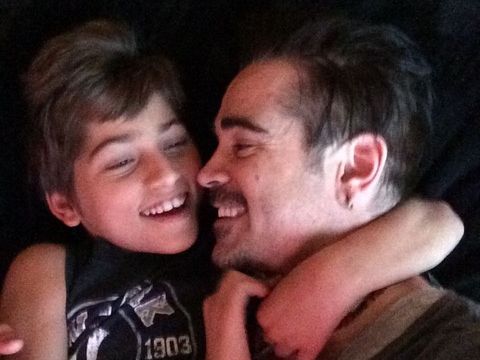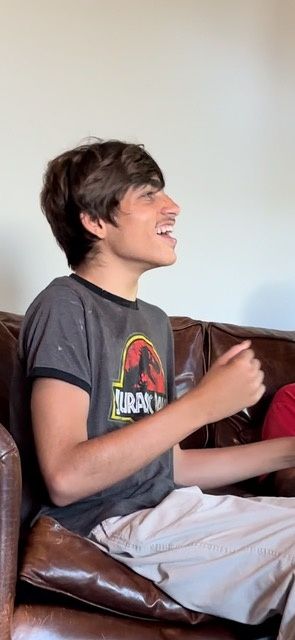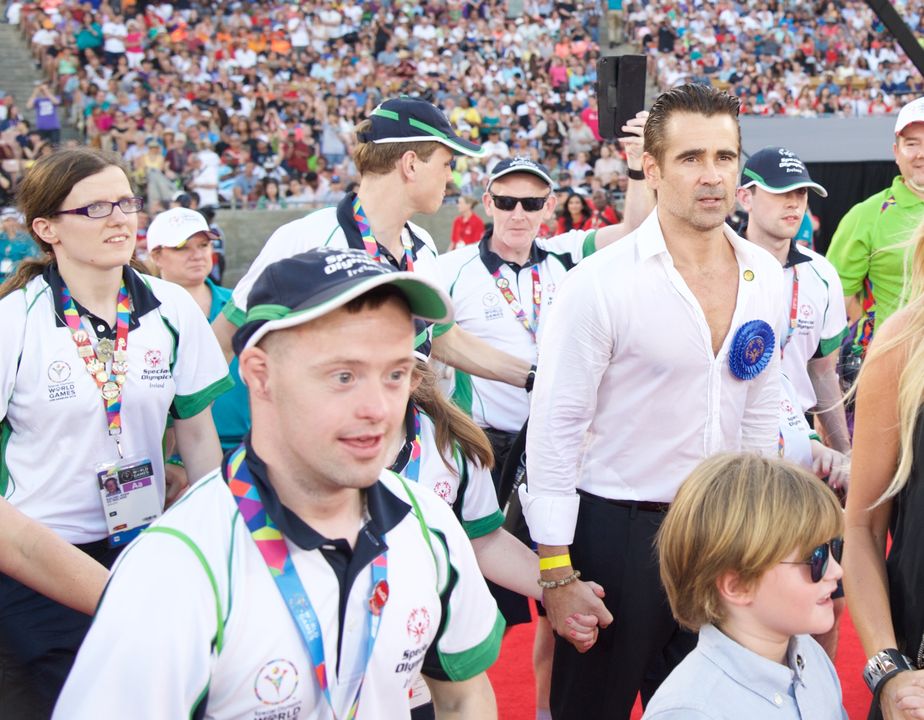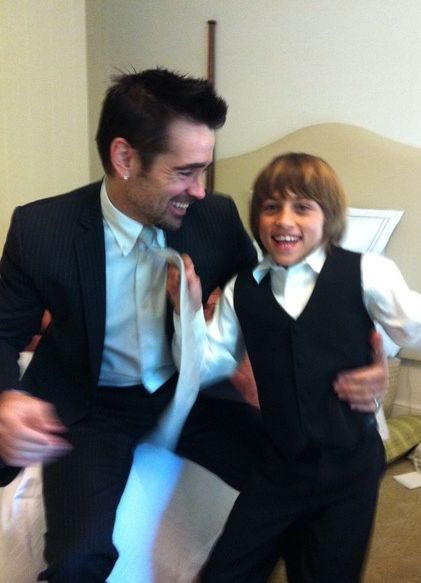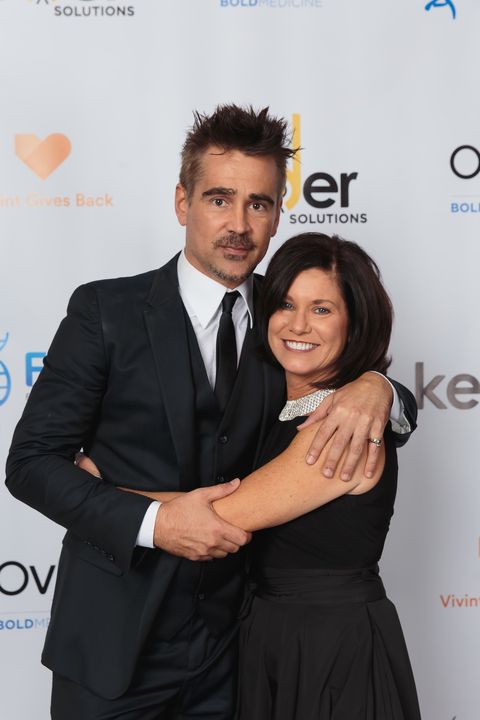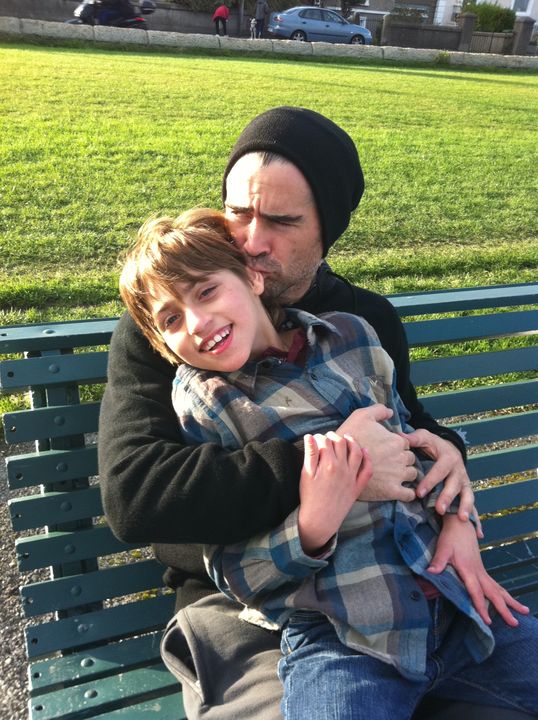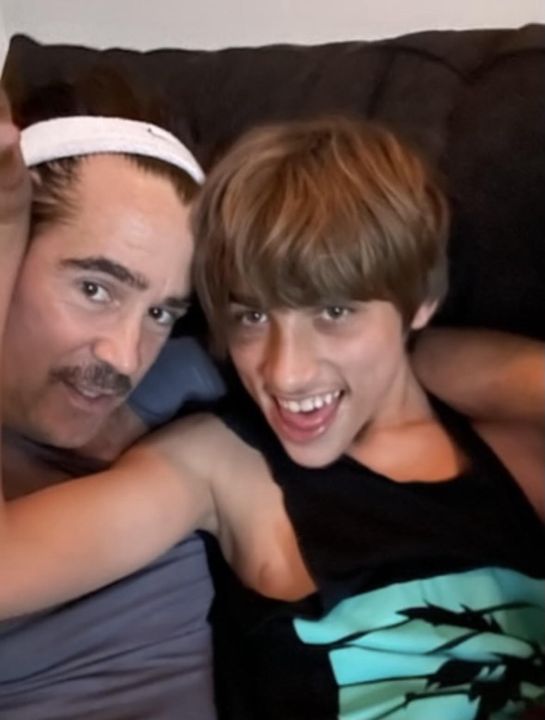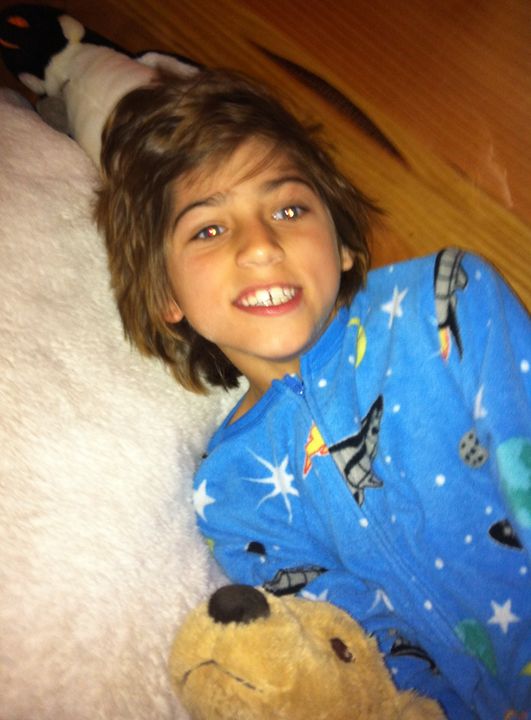Irish actor and family man sets up The Colin Farrell Foundation charity in son’s honour
He proudly led a group of athletes into the stadium as towns and villages across Ireland opened their homes and their hearts to athletes with special needs from all over the world.
“We were at our best,” The Penguin actor recalls now. “The whole country came together. Every pub had a bingo night for a local athlete. Every place was putting on something and members of our society who in the 1950s and 60s were kept at home more – all of a sudden they were the stars of the story. There’s nowhere in the world that I’ve experienced anything like it.”
Colin didn’t know it then, but within a matter of months, he would become the parent of a child with special needs. James was born with Angelman syndrome, a rare condition characterised by developmental delay, problems with speech and balance and, in some cases, seizures.
It means that James’s achievements and the many milestones he has reached have been hard earned and greatly celebrated – and next month, the young man will mark a major birthday.
James is about to turn 21 so Colin is trying to give him independence while also maintaining the necessary care
“He’ll be 21 in September – which is just mad – and he’s doing great,” says the actor. “He’s cheeky and he’s bold and he’s bright, and he knows exactly what he wants.
“He’s strong now – he’s six foot. He was always like a beanpole, but he’s filled out a bit, got a lovely big Ronnie (moustache) on him. He looks like Tom Selleck! He’s brilliant – he’s just a gorgeous young man, you know.
“And he’s in a really good place, and I’m delighted that he’s ready to get out in the world now and begin to be able to spread his wings and be a part of programmes that we (Colin and James’s mother, Kim Bordenave) are trying to figure out.”
James’s parents see him as a young man with his own life who wants to be out and about. But they are aware that this will bring challenges, as James’s condition means that he needs supported care.
“His mother and I are trying to think about the next stage of his life. He has earned autonomy, and he has earned having a greater sense of community and a greater sense of freedom,” says Colin.
“He shows us that, and he loves people, and he wants to be active in the community and all, but there’s just very, very little there.”
As the family seeks suitable and supported independent living for James, they have become aware of the dearth of such home care for young adults with intellectual disabilities. Inspired by James and out of a desire to do what he can to better the lives of the many other families facing similar challenges, the actor has decided to establish The Colin Farrell Foundation.
James sporting a ‘Ronnie’ as he continues to flourish
The newly launched, not-for-profit organisation aims to initiate and promote progressive programmes and policies to improve and enhance the lives of individuals living with any form of intellectual disability. The foundation will also work with other intellectual disability (ID) policy advocates in campaigning for change at US governmental level.
Colin will lead the foundation, managed by a board of directors and an advisory board. They are comprised of highly experienced and successful professionals in various fields. Paula Evans, who previously founded The Foundation for Angelman Syndrome Therapeutics (FAST), will be CEO.
Among the foundation’s goals is to raise awareness of the funding and housing crises affecting the ID community. As well as fundraising and awareness campaigns, the foundation aims to create a respite retreat for people living with any form of ID and their families. It will be called Solas, from the Irish word for light.
The foundation’s work will happen initially in California, where Colin and his family live and work, but his ultimate dream would be to replicate such advocacy and support services across the US and internationally – including in Ireland.
Colin at the Special Olympics in LA in 2015
“I’ve had 20 years to think about the struggles of a child with special needs, since James came into my world,” says Colin. “It’s very much been localised for me, of course, personalised. It’s very much been about James, about my son.”
Still, the communities he has met through Special Olympics, through FAST, and through his philanthropic work, convinces him that the challenges facing people with ID and their loved ones are universal.
“Mostly, the community that I’ve been a part of has been the Angelman syndrome community, which is very vocal and very supportive. I’ve met hundreds of families who care for and love and struggle with trying to find the resources they need. I’ve met mothers and fathers, grandparents and siblings, and talked to them about their experiences. And I’ve met the young men and the young women of these families going back 14,15 years now.
Colin is completely besotted with James and wants him to have as complete a life as possible
“I’ve been so blessed doing what I do for a living and having the career that I’ve had over the last 25 years. As you can well imagine, James has benefited a lot from the doctors I can get on the phone easier than most people, from the money I have to pay for certain therapeutic interventions: speech therapists and occupational therapists and physical therapists. And if James needs an iPad for communication, or if he needs a stander to work on his gait, it’s there. I’m that lucky, it’s gotten for him. Yet, I’m finding that James is a young adult now, and his mother and I are trying to think about the next stage of his life.
“I’m 48 and James is 20, and Henry (James’s younger brother) is 14. I have a little bit more space in my own life, in my own head. I feel the career thing, the acting thing, as much as I’m enjoying it and probably loving it more than ever, it’s clear to me that it is incredibly secondary, when I think of how important the present and the future of both my sons are to me,” adds Colin.
“If I have the struggles that I’m having with this kind of stuff, you can imagine a lot of the families I’ve met. Some of them have an income of 50 grand a year, and they have four children, and two of them have Angelman syndrome. How are they going to be able to provide or find somewhere that’s loving and caring and clean and active to allow their young adults to have a rich and meaningful connected to the community life? I realised it was time,” he says of establishing the foundation.
“This is something that means the world to me now.
“I’m blessed to have a bunch of good people on the board. We’ve a scientist, a lawyer, humanitarians – just really bright, really hungry, decent people whose hearts are in the right place and who want to make a change.”
Like Colin, the foundation’s CEO has lived experience of raising a young adult with an intellectual disability. Paula Evans’s daughter, Ainsley, was born with Angelman syndrome, and she made contact with the Irish actor when he first spoke publicly about how James had special needs.
“We had a lovely chat about our kids. And it wasn’t long after that that I started the FAST organisation,” says Paula, adding that the annual event they held in Chicago showed her that many of the issues facing families were universal.
“We grew the community beyond my wildest dreams, because Angelman was rare. Everyone came from all over. They came from all over the world – many from Ireland. Individuals with intellectual disability are facing multiple crises and those are funding, housing, and workforce – it’s really those three issues,” she adds.
Colin with his new Foundation boss Paula Evans
“Individuals with intellectual disability are stuck home with mom and dad, waiting sometimes decades for services that they could live meaningful, full lives within their communities. We have a broad mission statement and I have no doubt we’re going to start tackling this really significant problem.
“I don’t think many people are aware of the crises that people with intellectual disability face. So (we are) shining a big light on this, and just raising awareness so that everyday people understand.
“I think there’s nobody better suited than Colin to help bring this to the forefront, to raise that awareness. Not only does he walk the walk, he talks the talk, he lives this every day as a child that has intellectual disability, and he knows what the challenges are.
“He can speak about it in such an authentic way to really educate the public as to what the challenges are that these individuals face. He is so passionate about this – I’m excited to see what we’re going to be able to do.”
Colin adores James and has finally opened up his family album to the world
Colin has been motivated by the many stories he’s heard of parents who struggle to care for their children and to access the support services they need. “They’re constantly advocating on behalf of their child to get what their child justifiably should have in their lives, in the form of education, in the form of community inclusion.”
This is why his plans include Camp Solas, which he named after the Irish word for light. He is establishing it to provide badly needed respite services for people with ID and their families.
“It would be open for families, for parents and siblings of a child with special needs. They would come and the kids would have activities throughout the day. The parents would be able to have their own time and space, because it’s very hard.
“Parents of children with special needs don’t really go on holidays too much. They certainly wouldn’t go on holidays on their own – of course they bring their children. Whatever joy they may experience on the holiday, whatever craic they have, it’s also a lot of work. And so the idea is of giving parents a little bit of respite while the family would go together to the camp.”
The pair have forged an incredible bond
The foundation, he says, will enable fundraising, awareness and conversations about how best to serve the people who avail of its services. But Farrell also has a greater ambition that he hopes could bring about broader and real systemic change.
Among the foundation’s goals is to join other ID policy advocates in campaigning for national US legislators to provide badly needed funding and reform.
“The ultimate goal would be, within a couple of years, to end up in Washington and get a hearing and try and get some money allocated for exactly what we’re talking about – not summer camps, but for community centres where parents can bring their young adults, and also for more independent living that will obviously have around-the-clock support and care, and what that’s going to look like. So there’s loads to do,” he says.
The actor adds that in many countries in the world, it’s those who can’t do for themselves who get short shrift. “It’s children who are sick, and it’s people later in their years in old age. So much more attention should be placed on making sure that children and those who are older of age, who need more care, get more support.
Colin is trying to ensure James has the fullest life possible now that he is turning 21
“And there’s loads of great work, by the way. I’m not splitting the atom here now by saying what I’m saying. There are thousands of people in the world that are fighting for what I’m suggesting here. It’s just my time to get in the fight.
“The area of major interest for me, of course, is because of James’s birth and what he’s meant to me in my life and the community that I’ve been afforded the opportunity to be a part of that is so loving and so supportive.”
When James was four, Colin first spoke publicly of his son being born with Angelman syndrome. Just a few weeks earlier, James took his first steps unaided, a moment that brought great joy to his family.
“Most kids are walking somewhere around one, one and a half. So what seem like minor steps are huge successes, and we all celebrate each other’s successes,” says Colin.
“There’s so much chance involved in life. There’s beyond measurable chance that has me talking to you now from a hotel in Macau, doing my third film in the last 12 months, and having all the good fortune that I’ve had in my life. You couldn’t work hard enough to have the fortune that I’ve had. I love my work, and I apply myself to it as best I can. But it’s chance – it’s so much chance.
“The fact that I have a bit of a voice, I want to use it to see if we can promote change and get some systemic change. Work to get some legislative change that will provide greater support for our communities, and not just Angelman syndrome, but communities of all children (with ID) as they grow up to be adults.
“We need to have a world and a place where they are involved and included and have meaningful lives, and it’s just harder now for families than it should be. So that’s why we’re doing this.”
Colin spoke to Esther McCarthy in 2007 to reveal his son’s syndrome
When Colin first spoke publicly about James’s Angelman syndrome diagnosis in 2007 – just days after his four-year-old boy had taken his first steps – the actor said he would do whatever he could to help James realise his potential and to be happy.
“It’s like any parent,” he said at that time. “What I want to do for my son is make sure he has the opportunity to reach his own individual potential, and that he’s as happy as can be. I’ll do whatever I can do, stay in his way or get out of his way, to see that realised.”
As James approaches his 21st birthday, his dad reflects on those words. “It’s time to kind of get out of James’s way a little bit, for the first time in my life,” he says.
“I do believe fully, in every cell of my being, that’s what he wants, and that’s what he’s earned, that’s what he’s worked so hard all these years for in his socialisation and his schooling, his at-home work and physical therapy and occupational therapy. All the stuff he’s had done with his legs and his walking, so he can have a bigger life.”
His lived experiences of raising James and his aspirations for The Colin Farrell Foundation’s work, unsurprisingly, go hand in hand – and the actor is ready to take the next step in advocating for young adults with ID.
“I want to talk about how to help make the lives of our children and young adults with special needs better and to try and see if I can, in any way, help in ensuring that they have opportunities they should have in life.”
Instagram: @colinfarrellfoundation
Tik-Tok: @colinfarrellfoundation
Facebook: Colin Farrell Foundation
Website: www.colinfarrellfoundation.org

